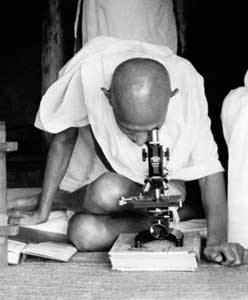White coats at protests? Maybe not.

Photo: Treatment Action Campaign and Student Global AIDS Campaign protesters at last year's International AIDS Conference, part of a coalition opposing Abbott Laboratories' approach to access to AIDS drugs.
I'm going to be taking part in a global day of action to condemn Abbott Laboratories for their attempt to block compulsory licensing of one of their AIDS drugs, known in the United States as Kaletra. This is an important medicine for people with AIDS, and Thailand wants to produce generic versions of it for impoverished people living with HIV and AIDS, who could not otherwise afford it.
The Bangkok Post has an editorial which lays out the legal issue from a Thai point of view. This one is pretty stark: Abbott is deliberately trying to roll back agreements about international trade rules, because the company doesn't like them.
There's more to say about Abbott, but I'll save that for now. In the meantime, I am now wrestling with a less important problem familiar to all 4 or 5 regular Hemodynamics readers, and a problem that afflicts all casual activists who only attend protests now and then: what to wear.
On its face, this is a silly thing to spend much time worrying over. But protests in the television age, and even more so in the digital image age, require careful attention to symbolism. And it turns out that as a future doctor I've got a lot of symbolism to think carefully about.
Medical students have often worn white coats to protests, as have doctors. This is a way of bringing professional credibility as a form of solidarity. But I've never done this, and though I thought about it earlier this evening, I don't think I will this time either.
This particular issue is fairly clear: when people don't get medicines to treat HIV, they often die of AIDS. Incredibly enough, and despite everything bad you can say about an organization like the World Trade Organization, nations around the world have agreed on ways that countries can make sure people get medicines. If you want to reap the benefits of global capitalism you should at least play by its very limited rules.
This message does not require a white coat for its credibility.
To say that you should listen to my views about intellectual property policy because I'm going to be a doctor would be absurd. After all, so many other doctors have been so egregiously wrong about this kind of issue that I would hate to encourage people to listen to doctors about patent policy. As far as the embroidery on my white coat, it says "Harvard Medical School" and it doesn't say my name. And I don't believe there's anything about my Harvard Medical School education that makes me any more equipped than any other reasonably well-informed person to express my opinion about Abbott's approach to intellectual property. All I know now that I didn't know before is the details of how people die from lack of medicines, and what happens to their various organ systems as they get more ill.
You could argue that wearing the white coat is a kind of threat to Abbott, along the lines of the anti-Abbott coalition's suggestions for doctors that they prescribe equivalent generics instead of Abbott products, refuse to talk to Abbott drug reps, and refuse to accept gifts from Abbott reps. But for me, this would not be sending the right message: whether or not Abbott cares about Thai people living with HIV and AIDS, I will prescribe generics when I can, I won't talk to drug reps, and I won't accept gifts. If I was the kind of doctor who was actually thoughtlessly prescribing unneeded overpriced brand name drugs and getting chummy with drug reps, I probably wouldn't be going to a protest at Abbott headquarters anyway.
Another entirely opposite direction would be the Treatment Action Campaign's "HIV Positive" t-shirt. But I've always felt that this shirt has a different meaning in the United States than it does in South Africa, and it definitely means something different when worn by groups of people which do not include many people living with HIV. In the US, the meaning of this shirt can be helpful but it can also be presumptuous; tomorrow, at least, I'm not taking this approach.
The only visual signal I might feel comfortable displaying is letting people know that I am a health worker--someone who makes it their life's work to care about the well-being of people who are sick. I'm uncertain about the political value of that gesture, but I think that at least it is a visual reminder that the protest is an issue of health, and survival, and not just an issue of market rules.
In other words, I've reduced my protest wardrobe to two alternatives: I can either dress as just me, a concerned citizen--or I can dress as a health worker. Considering the health worker option, I realized once again that if I take this route, I would not wear the clothes of the profession (the white coat), but of the hospital and all who work on its clinical floors: I would wear scrubs.





No comments:
Post a Comment